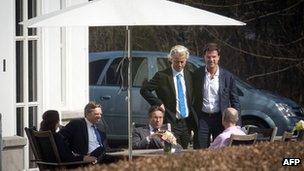Europe: Things fall apart
- Published
- comments

Dutch PM Mark Rutte (standing, right) failed to get a coalition deal on budget targets
The eurozone crisis is not just back. It has returned in a much more dangerous form. This time the questions are more fundamental.
The doubts about the whole austerity strategy - made in Germany and policed by EU officials - are openly expressed.
The French elections lay bare the fault lines. If the Socialist candidate Francois Hollande wins he will not just be the first victor from the Left in France in 17 years. He has put down a marker - that he will challenge German leadership of the debt crisis.
Mr Hollande believes that austerity first is destroying parts of Europe. Yes, deficits have to be cut, but his priority will be growth. He has pitched his statements not just to the French people but to the rest of Europe. He wants to reorientate Europe on a path of growth and employment. It was not a surprise that yesterday Angela Merkel's spokesman at the German Chancellery said she still backs President Sarkozy.
The crisis, for a period, was confined to mainly southern European countries like Spain, Italy, Greece and Portugal. It has now spread to the core.
The Dutch government, which had been an advocate of the strict austerity medicine, has collapsed. It found itself struggling to meet deficit targets. The government could not agree on the budget cuts needed to meet the targets set by EU officials.
The far-right politician Geert Wilders said "we don't want our pensioners to suffer for the sake of the dictators in Brussels". So the Netherlands drifts, awaiting elections in September, fearful that its AAA credit rating is at risk.
The fall of the Dutch government undermines the pact to enforce budgetary discipline in the eurozone agreed in December. This was Angela Merkel's great project to ensure that ill-discipline and overspending never haunted the currency union again. It already looks tattered.
Challenge from voters
The Spanish have challenged EU targets for reducing the deficit. Now, too, the Dutch. Francois Hollande promises to renegotiate the pact if elected French president, and shift the emphasis towards growth. The flaw of the pact is that politicians and governments in the end will listen to their voters.
The Germans are rattled. The foreign minister says the pact must remain in place. "What we have agreed on in Europe to overcome the debt crisis", said Guido Westerwelle, "is agreed and it holds".
"It will not be made dependent on election results." That is, of course, part of the problem because electorates want their votes to count.
The European economy is weakening. Even in Germany there is a sharp fall in manufacturing activity. Spain officially went into recession yesterday. Despite reductions in deficits, debt levels are still rising. Unemployment is increasing.
All of this reinforces the question: is the strategy for cutting deficits and depending on structural reforms to boost growth working?
Across Europe there are signs of revolt. In France 6.5 million people voted for the far-right candidate, Marine Le Pen. Over 30% of French voters supported candidates who rejected austerity and were hostile to Brussels. The mood is one of deep disaffection towards mainstream parties. The elite is struggling to control the narrative.
On the same day that the French will return to the polls to elect a president - 6 May - the Greeks will go to the polls. A majority of Greek MPs elected may well challenge the austerity terms of the second bailout demanded by the EU, the European Central Bank and the IMF. It was announced today that the Greek economy this year will shrink by 5% - the fith year of recession.
The problem is this: these countries - in a monetary union - cannot devalue. Their only remedy is internal devaluation, cutting wages and pensions in the hope that they can restore competitiveness with Germany. For many what lies ahead is years of hardship and austerity. It is a tough sell.
Difficult days are looming. A few months back Germany was dominating the argument in Europe. It is now much more isolated. Debt and deficits have to be reduced, but cuts to budgets and to social programmes are feeding into an unpredictable resentment in Europe.
Things fall apart.